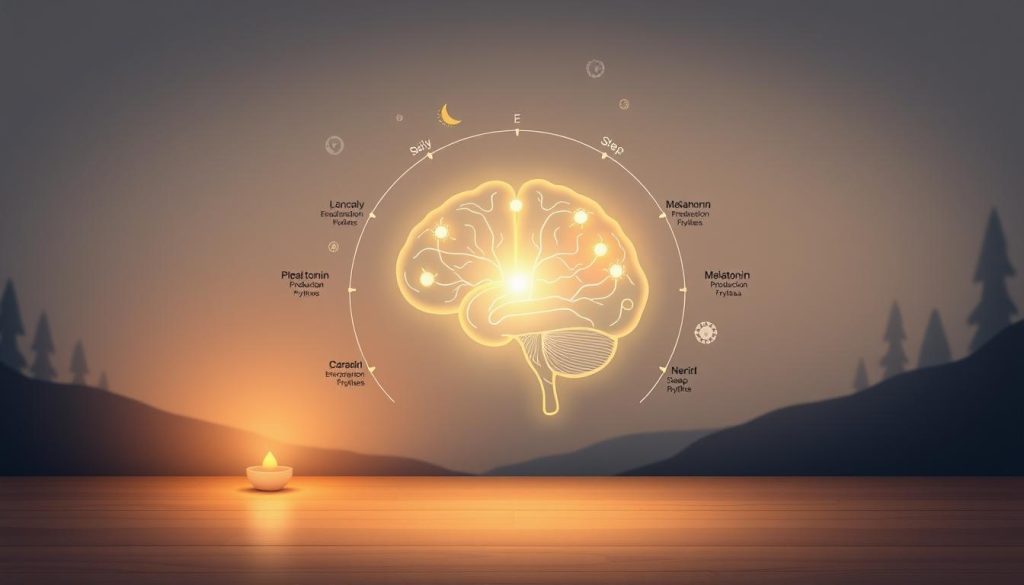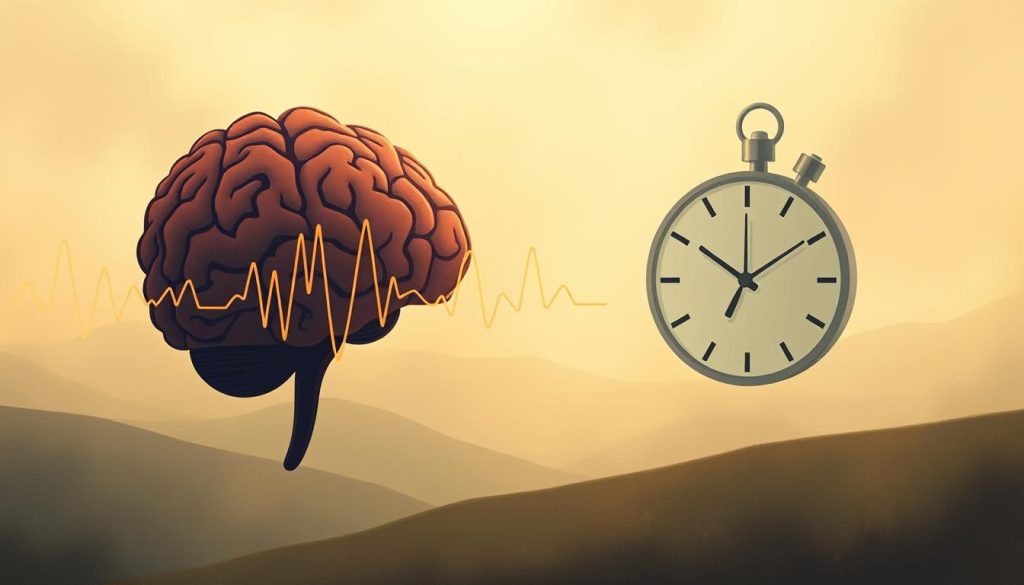Modern life messes with our natural body clock. We stay up late, scroll phones, and drink coffee at midnight. This messes with our energy levels.
Your body has an internal timing system, called the circadian rhythm. It affects how you deal with daily stress. When it’s off, even small issues can feel huge.
Working with your body’s rhythms is key to managing stress. Making small changes to your routine can help. This guide will show you how to align your lifestyle with your body’s needs. You’ll sleep better, feel less anxious, and have more energy.
Understanding Circadian Rhythms and Their Importance
Learning about your internal clock is key to better stress management and well-being. It affects more than sleepiness. It controls hormone release, body temperature, and immune system function.
When your internal timing is right, you have steady energy during the day. You sleep well at night. And, you handle stress better.
What Are Circadian Rhythms?
Circadian rhythms are 24-hour cycles in your body. They regulate biological processes. Think of them as an internal schedule for your body.
These rhythms control hormone production. For example, melatonin helps you sleep in the evening. Cortisol wakes you up in the morning. Blood pressure, body temperature, and digestion also follow these patterns.

These rhythms evolved to match the Earth’s light-dark cycle. Our ancestors were active during the day and rested at night. Modern life often disrupts these patterns, causing health issues.
The Biological Clock: How It Works
Your biological clock is in a small brain area called the suprachiasmatic nucleus. It has about 20,000 nerve cells. It acts like a conductor, coordinating timing in your body.
Daylight exposure keeps your internal clock in sync. Darkness triggers melatonin production, making you sleepy. This prepares your body for rest.
Your biological clock also talks to smaller clocks in organs. These smaller clocks help with local functions. When everything works together, you feel energized during the day and tired at night.
But, artificial lighting and screen time can confuse your clock. Disrupted melatonin production affects sleep quality. Poor sleep makes stress management harder, impacting your health and well-being.
The Connection Between Circadian Rhythms and Stress
Your circadian rhythm and stress hormones are closely linked. They affect your quality of life. Your internal clock helps you deal with stress, but stress can mess with your natural rhythms. When they’re in sync, you feel good during the day and calm at night.
But, if they’re out of balance, it’s tough. Your body needs a precise schedule to manage hormones and energy. This balance is key to your health.

How Stress Impacts Sleep Patterns
Stress makes your body release cortisol and other hormones. These keep you alert. But, they can also mess with your sleep.
Here’s how stress affects sleep:
- Cortisol stays high when it should go down at night
- Your mind is full of worries, making it hard to relax
- Stress hormones make your muscles tense, making it hard to relax
- Your body temperature is too high, making it hard to fall asleep
- Stress hormones can wake you up a lot at night
This messes up your sleep, making you more stressed the next day. You can’t handle daily challenges as well.
The Role of Sleep in Stress Management
Good sleep is like a reset button for stress. It lowers cortisol levels, helping your nervous system recover. This is key for emotional balance and resilience.
Sleep offers these stress-fighting benefits:
- It helps your brain process emotions
- It clears mental clutter by organizing memories
- It helps your cortisol levels for the next day
- It repairs damage from stress hormones
- It boosts your immune system against stress-related illnesses
When your circadian rhythm is in sync, cortisol levels follow a natural pattern. They rise in the morning to wake you up. Then, they drop at night to help you sleep.
Knowing this connection shows sleep is essential for managing stress. Good sleep quality is key to handling life’s challenges better.
Strategies for Aligning Your Circadian Rhythm
Improving your sleep and stress levels is easier than you think. By using simple, proven methods, you can change how you rest and recover. It’s all about being consistent and patient as your body adjusts.
When you get your circadian rhythm right, you’ll feel less stressed and more energetic. Your body loves routines that tell it when to be awake and when to sleep.
Establishing a Consistent Sleep Schedule
Going to bed and waking up at the same time every day is key. This helps your body’s internal clock and makes sleep easier. Aim for seven to nine hours of sleep each night.
Keep your sleep schedule the same, even on weekends. This boosts your sleep quality a lot. Most people see big improvements in just two weeks.
Use phone reminders to help stick to your new bedtime. Start by going to bed 15 minutes earlier each night until you reach your goal.
Creating a Relaxing Bedtime Routine
A calming routine before bed tells your body it’s time to sleep. Start this routine an hour before bed. It helps your mind and body relax from the day’s activities.

Try gentle stretching, reading, or a warm bath. Writing in a gratitude journal can also help. These activities lower stress and help you sleep better by calming your nervous system.
Avoid activities that get you excited or stressed before bed. Your bedtime routine should be something you enjoy and look forward to.
Limiting Exposure to Blue Light
Blue light from screens can make it hard to fall asleep. It tricks your brain into thinking it’s still daytime. To fix this, limit your screen time in the evening.
Turn off screens at least an hour before bed. Use blue light blocking glasses if you need to use devices at night. Use dim, warm lights in your home after dark to help your body produce melatonin.
Many devices have blue light filters that turn on in the evening. Turn these on to cut down on blue light without giving up technology completely.
The Role of Nutrition in Circadian Health
Nutrition is key to keeping your circadian rhythms healthy and managing stress. Your digestive system has its own clock, working with your body’s natural rhythm. Eating at the right times helps your metabolism and stress levels.
Food affects your internal clock more than you think. Your gut has genes that respond to when you eat. This influences hormones, energy, and stress handling.
Foods that Support a Healthy Circadian Rhythm
Some nutrients help your body make sleep chemicals. Foods like turkey, eggs, and pumpkin seeds boost serotonin and melatonin. These are vital for sleep.
Magnesium helps muscles relax and your nervous system. Find it in almonds, spinach, and dark chocolate. Complex carbs from oats, quinoa, and sweet potatoes give steady energy and support neurotransmitters.
Tart cherries have melatonin, great for an evening snack. Leafy greens like kale and Swiss chard have folate and magnesium for your rhythm. Fatty fish like salmon and sardines regulate your clock with omega-3s.
But, some foods can mess with your rhythm. Caffeine after 2 PM can hurt sleep. Alcohol might make you sleepy but disrupts deep sleep. Heavy meals before bed stress your digestive system.
Timing Your Meals for Stress Management
When you eat is as important as what you eat for circadian health. Your metabolism is strongest in daylight, making breakfast and lunch best for big meals. This pattern supports your energy and lets your digestive system rest at night.
Eating your biggest meal early helps set your internal clock. Finish dinner three hours before bed. This lets your body digest before sleep.
Regular meal times send signals to your circadian rhythm. Eat breakfast, lunch, and dinner at the same times. This strengthens your internal clock and improves stress response.
Drink water all day but cut off fluids two hours before bed. A small, protein-rich snack in the evening can keep blood sugar stable without upsetting your stomach.
The Benefits of Mindfulness and Relaxation Techniques
Mindfulness and relaxation techniques help your body manage stress and sleep better. They work with your body’s natural rhythm to calm you down. Regular use changes your nervous system to a peaceful state.
These methods are simple and effective. You don’t need fancy tools or lots of time. Just a few minutes of focus can help your body handle stress better.
Incorporating Mindfulness into Your Daily Routine
Morning meditation sets a calm tone for the day. Even a short quiet time can help control stress and support sleep. Pick a regular time and spot for your practice to make it a habit.
Evening mindfulness helps your body get ready for sleep. It follows your natural rhythm for winding down. Progressive muscle relaxation is great for this.

Try tensing and relaxing muscles from toes to head. This technique releases tension and prepares you for sleep. It lowers stress hormones and helps your body relax.
Breathing Exercises for Stress Reduction
Breathing exercises offer quick stress relief and can be done anywhere. The 4-7-8 method is great for calming your nervous system. Breathe in for four, hold for seven, and exhale for eight.
This method quickly resets your stress response. Regular use helps you calm down faster when faced with challenges. It’s especially helpful before bed to support sleep.
Box breathing is another effective stress management tool. Breathe in for four, hold for four, exhale for four, and hold empty for four. This rhythm helps your nervous system and circadian rhythm align.
These practices create a positive cycle in your body. Better stress management means better sleep, which makes you more resilient to stress. Regular practice changes your brain to be calmer and more emotionally stable.
The Impact of Physical Activity on Circadian Rhythms
Exercise and circadian health are closely linked, helping manage stress all day. Physical activity is a natural way to keep your internal clock in sync. Regular exercise trains your body to stay in rhythm.
Your body changes in response to exercise, adjusting temperature and hormone levels. These changes help keep your sleep-wake cycle on track. Exercise also helps manage stress through various biological pathways.
Optimal Exercise Timing for Better Sleep
Morning workouts are best for aligning with your circadian rhythm. Exercising from 7 AM to 10 AM boosts your body temperature during wake hours. This signals to your brain that it’s time to be awake and active.
Working out in the early afternoon, from 1 PM to 3 PM, also supports your circadian rhythm. It helps fight the natural afternoon slump. Your body temperature rises again, keeping you alert throughout the day.
Avoid intense workouts close to bedtime. Late evening exercise can interfere with sleep preparation. Your nervous system gets too stimulated when it should be calming down for sleep.
- Morning exercise: 7 AM – 10 AM for maximum circadian benefits
- Afternoon sessions: 1 PM – 3 PM to maintain energy levels
- Evening limit: Stop intense workouts 3-4 hours before sleep
- Light activity: Gentle stretching or yoga acceptable in evening
Exercise as a Natural Stress Reliever
Physical activity releases endorphins, which boost your mood. These chemicals help reduce stress levels. Even a short walk can improve your mental state.
Regular exercise also lowers cortisol, your stress hormone. High cortisol levels can disrupt sleep and lead to stress and fatigue. Exercise helps manage cortisol, supporting better sleep and stress management.
Exercise is a healthy way to release tension and anxiety. It helps your body process stress hormones more efficiently. This allows your body to return to balance faster after stressful events.
Consistency is key for stress reduction, not intensity. A daily 30-minute walk offers more benefits than occasional intense workouts. Choose activities you enjoy to keep moving regularly.
Regular physical activity improves sleep quality. Exercise helps you enter deeper sleep phases, crucial for stress recovery. Better sleep means waking up refreshed and ready to face daily challenges.
Creating a Stress-Reducing Environment
Your surroundings are key to supporting your body’s natural rhythms and stress levels. The places you spend time can either help or harm your balance. Creating a calm environment is crucial for better sleep and less stress.
The Importance of Sleep Hygiene
Sleep hygiene is about habits and environments that help you sleep well. Keep your bedroom cool, between 65-68°F, as your body cools down while sleeping. Darkness helps your brain make melatonin, so use blackout curtains or an eye mask.
Noise can break up your sleep, so white noise machines or earplugs can help. They ensure you get consistent rest.
Designing a Calming Bedroom Space
Your bedroom should be a place of calm. Choose colors like soft blues or greens. Remove work stuff and devices that cause stress.
Plants can clean the air and add peace. Keep surfaces clear to feel calm.
These changes are strong relaxation techniques that help your body’s natural rhythm. When your space matches your body’s needs, managing stress gets easier. Small changes can make a big difference in your sleep and well-being.

